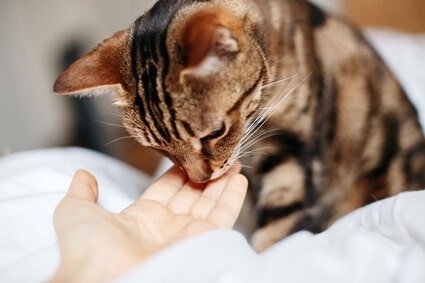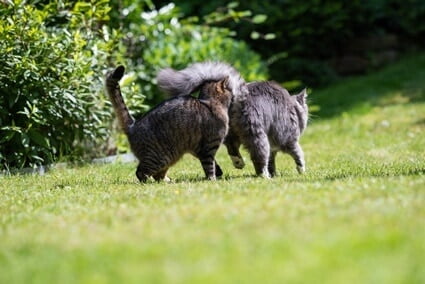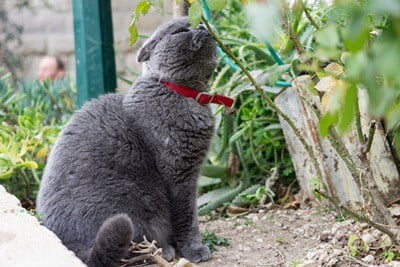Cats largely navigate their world using their noses. A quick sniff can tell a cat what an object is, who it belongs to, and where it’s been. Because of that, your cat will readily sniff any new area it’s placed in or new objects you provide.
Cats smell everything to gather information and familiarize themselves with new scents. The cat may be identifying what territory lines exist and if it wants to challenge them. It may be deciding where to leave its own scent marks, such as on furniture or other pets. Your cat might be detecting prey or a potential new mate.
Cats will sniff your hands or breath to tell who you are, where you’ve been, and what you’ve touched. Sniffing other pets, be they cats or dogs, will accomplish the same goal. Cats also sniff each other’s butts to learn their sexual status, age, and personality. Sniffing the air allows cats to gain information from longer distances, so they don’t need to investigate in person. If your cat is sniffing everything, then you can be sure that it’s found something interesting.
How Good Is a Cat’s Sense of Smell?
Cats have an excellent sense of smell. In fact, it’s 14 times more powerful than a human’s. That’s because cats have as many as 50 to 80 million olfactory receptors in their noses. Meanwhile, humans only possess a mere 5 million.
When compared to dogs, cats have a weaker nose but a more precise sense of smell. Cats are not able to retain scents for as long or detect them from such great distances. However, according to the Annual Review of Physiology, cats can distinguish one scent from another with more accuracy than dogs.
In fact, researchers have found that cats respond most positively to the smell of decaying animals over the scent of herbs. They’re also more likely to detect small ingredient changes in their food than dogs. That means when a cat decides to investigate everything in your house, it’s getting a precise insight with its nose.
What Does It Mean When Your Cat Smells Everything?
In short, if your cat is smelling everything, it’s trying to learn something about everything. While humans mostly rely on sight and touch to explore their surroundings, cats depend on smell. According to Applied Animal Behaviour Science, it’s their main way of gathering information and interpreting the world around them. A quick sniff can tell a cat:
- Where food is
- What the weather is going to be like
- What cats (and how many cats) are nearby
- If someone is ill
- If something is poisonous
- What an object is made of
This list is certainly not exhaustive. Cats get a major download when they closely smell objects, people, and other creatures. That makes it no surprise if your cat smells anything and everything new to it.
If the cat is newly adopted, it will try to smell everything in its room, even the floors and walls. If the cat has moved into a new home with you, old and familiar objects may take on a slightly new odor. Once the cat is settled in, it may only smell things that are interesting or that have piqued its curiosity. Aside from general information-gathering, it may be:
Picking Up A Message
Cats use smell as one of their primary forms of communication. With the use of different pheromones and scents, they can tell other cats:
- Where they are
- What sex they are
- What territories or objects belong to them (and if others should stay away)
- If they are sick or in good health
- If they’re related to one another
- If they want to mate
In fact, vocal communication falls by the wayside in comparison. Adult cats do not even meow at each other. They reserve this almost entirely for humans. If a cat wants to send a message, it will do so with its scent glands, urine, poop, or saliva.
Any cat nearby will be able to understand this with its powerful nose. If your cat is smelling everything, then it may be picking up a message from one of your other cats. In some cases, it’ll even try to interpret scents from a different pet altogether, like your dog.
Checking Territory
Cats are not strictly territorial, but they have preferred areas, objects, and creatures to call their own. Since felines speak through smells, your cat’s first instinct upon visiting a new place will be to smell everything. In doing so, it’s essentially asking:
- Who is here?
- Does another cat have a claim to the spot?
- How many cats have been here?
- Do I want to try and take this place?
- Will I be safe if I try to share it?
- Are there other animals nearby?
Cats are careful of what territory they invade and who they challenge. Aside from hygiene reasons, most cats will bury their poop to mask the scent of a dominant cat, according to another article from Applied Animal Behaviour Science. If they don’t want a fight, they certainly don’t want others to think they’re trying to take over. Leaving a scent mark indicates ownership, so your cat may be smelling everything in an attempt to find an existing scent mark.
It may or may not find one. If no scent-mark is present, the cat will either leave its own or get bored and ignore the object. If your cat has done this already but is now doing it again, consider if you’ve brought home new scents by accident.
Deciding Where To Scent-Mark
The cat might decide it likes a place or toy and wants to claim it. To accomplish that, it will sniff all over the toy or throughout a room to decide where it wants to leave its own mark. Your cat might smell the floor, check the sofa, or even sniff at tables. Once it’s found a place it likes, it will begin rubbing against the objects.
The main scent glands of a cat are located across the face and throat. By stimulating these spots, a cat releases pheromones that are unique to it. This will leave its own unique mark and verify the spot as claimed. That is until another cat decides to come along and re-mark it.
Felines will also do this to other creatures. If your cat is smelling the entire room and wants to sniff you, other pets, and family members, it is bunting. According to Clinical Techniques In Small Animal Practice, cat bunting accomplishes two things. It lets the cat:
- Get a status update on the animal or person’s health, where it’s been, and even its mood.
- Leave its scent mark, so the animal/person is marked as important (and can return the favor, if it’s able).
This even allows cats to establish other creatures as friendly and recognizable or unknown and dangerous. The cat will identify you at a distance just because you have its scent mark. Cats will often refresh this marker so that they can easily recognize you as part of the family.

Deciding Where To Scratch
Cats will smell around to decide if there’s an appropriate place to sharpen their nails. This may be somewhere inappropriate, like your sofa, or include a new scratching post that your cat has never seen before. Smelling gives your cat a chance to learn valuable information, such as:
- What it’s made of
- If it’s the right texture
- If there’s anything harmful growing on it, like mold or bacteria
- If it’s been claimed by another cat (and can it share)
Once your cat has this insight, it can then decide if it wants to scratch the spot. Going in blind might lead the cat to touch something harmful or unpleasant. It may also just be a waste of time, like scratching a wall that doesn’t have enough resistance.
Although odd-sounding to most people, cat scratching is also closely linked to cat smelling behavior. This is because cats have smaller scent glands underneath their paw pads. When a cat scratches your sofa, a blanket, or the carpet, it’s leaving behind its personal scent as a way of marking its territory. Smelling it beforehand gives your cat the chance to decide if it wants to do this at all.
Detecting A Mate
If your cat is well-settled into the home, it shouldn’t have much left to smell and investigate. However, all that can change once it detects the pheromones of a mate nearby. This is especially true if your cat is unfixed.
A male cat can recognize the smell of a female in heat from up to 2 miles away. Of course, this depends on the direction of the wind, if both cats are outside, and factors like humidity and temperature. However, it still means your cat is capable of smelling a mate that’s right outdoors, or that’s walked through your home.
If you recently babysat a friend’s cat, even the leftover smell on you could have your own cat going smell crazy when you get home. The feline may then be encouraged to smell any spots you’ve touched around the house or any clothing the potential mate touched.
Why Do Cats Sniff the Air?
Cats sniff the air because they can detect many smells and pheromones in the air. In fact, odors carried on the wind make it possible for cats to smell across greater distances. As expert hunters, they’re even smart enough to stay downwind from prey. This enhances their ability to identify and track prey and also keeps the prey from smelling them in return.
Cats even use a special organ to catch more smells in the air. This is called the vomeronasal organ or Jacobson’s organ. It is located in the nasal cavity, and it has openings in the roof of the cat’s mouth behind the incisors.
This organ acts as a second nose. However, rather than enhancing the power of the existing olfactory system, it is used to detect more subtle pheromone signals that the nose can’t detect. To use it, cats open their mouths as if to smile and breathe in.
If your cat is smelling the air, especially with its mouth open, it’s trying to narrow down a specific scent. The Jacobson’s organ mostly detects pheromones related to mating. For kittens, it also serves as a way to identify their mother from other female cats. Aside from those two purposes, though, your cat may be trying to identify:
- Where food is
- How close prey is
- Where other cats are
- What an unfamiliar smell is
Why Do Cats Sniff The Floor?
The floor may seem basic and uninteresting, but for a cat, it holds many smell-related secrets. A few might include the odor of:
- Spilled and cleaned-up food
- Catnip from a toy, even if it’s just traces
- Other pets
- Shoe polish
- Cleaning supplies
- Anything else strange and unfamiliar
However, because a feline’s sense of smell is so powerful, it shouldn’t need to put its nose directly on or near the floor to detect these. Being nearby is more than enough.
If your cat is persistently smelling the floor, then check that area. It may have strong residue from a spilled drink, or leftover smells from a mouse your cat finished off there. In some cases, pesticide in the corners of the room, where the floor meets the wall, could be luring in your cat. Take a closer look and remove the curiosity if it’s dangerous or if you’re unsure.
Why Cats Sniff Each Other’s Bottoms
Like dogs, cats will sniff each other’s butts to confirm who they are and what they want. This formal “hello” is made possible with the use of scent glands. In particular, the anal glands of a cat contain a great deal of information. Cats can check each other’s health, age, sexual status, and how they relate with a quick sniff.
Moreover, each cat has a unique and signature “butt scent.” That makes it possible for cats to tell each other apart, presume if they’ll get along, and decide a limited hierarchy. The cat that initiates the butt-sniffing is normally the more dominant feline. After waiting for its turn, the submissive cat will judge the situation and normally leave. However, some cats may be more persistent and become aggressive.
Not all cats are expressive communicators. Often, some will remain sitting when approached by another feline. Using their tails to cover their anal glands, they choose not to give off any information about themselves.

Why Do Cats Sniff Your Hand?
Cats will sniff your hand because this is one of the most informative areas to smell. After all, your hands will smell strongly of you, where you’ve been, and what you’ve touched. With the addition of some palm sweat and scents picked up from touching your own hair or neck, cats have all they need in a single whiff.
As a plus, felines are cautious animals and won’t immediately feel comfortable invading your space. That’s especially true if you’ve just met the cat and haven’t developed a bond. Getting up by your face puts the cat in danger if it doesn’t trust you. Sniffing your hand keeps you, literally, at arm’s length and still gives the cat any information it needs.
Cats will also prioritize information about where you’ve been, what you’ve touched, and any other cats you’ve interacted with. Another feline may only pick up these smells by rubbing against another cat. For you, petting a friend’s cat with your hand makes your hand the epicenter of evidence.
That’s why your cat may immediately want to smell your palm or fingers once you get home. It needs to know who the cat is, if it tried to scent-mark you and if your own cat needs to reapply its mark.
Why Do Cats Smell Your Breath?
For a more trusting cat, your breath is a great source of information. Humans release a great deal of our most characteristic scents from our mouths. As a plus, these smells are also warm and moist. By getting up in your face and smelling at your nose and mouth, your cat is:
- Smelling one of the most distinctly ‘you’ scents you can produce
- Getting a stronger reading on your health status
- Taking comfort in the warm smell, like it might with other cats or its mother
According to Oncoscience, cats can detect the smell of tumors and certain diseases or sicknesses. It is believed that cell degeneration (and in the case of tumors, decay) produces a distinctive odor, especially when it’s just under the skin.
Cats aren’t as skilled as dogs in picking this up since canines have a stronger olfactory system. However, there are reported cases of felines appearing to ‘know’ when their owner is ill, even before the owner did.
Since cats rely so heavily on communicating through smell, it’s no wonder they can also communicate about health through odors. By checking your breath, your cat may be getting subtle updates about how you’re feeling and if something’s wrong with your health.
However, this isn’t the only reason. A cat might also sniff your mouth if it’s hungry and suspects that you’ve eaten something recently. If it can detect the smell of food, it will likely cuddle up against you in hopes of getting some food for itself.
Cats smell everything because it’s their most reliable way of understanding the world around them. This is normal and instinctive behavior. In the same way that you might take a closer look at something unfamiliar, a cat will sniff it.

